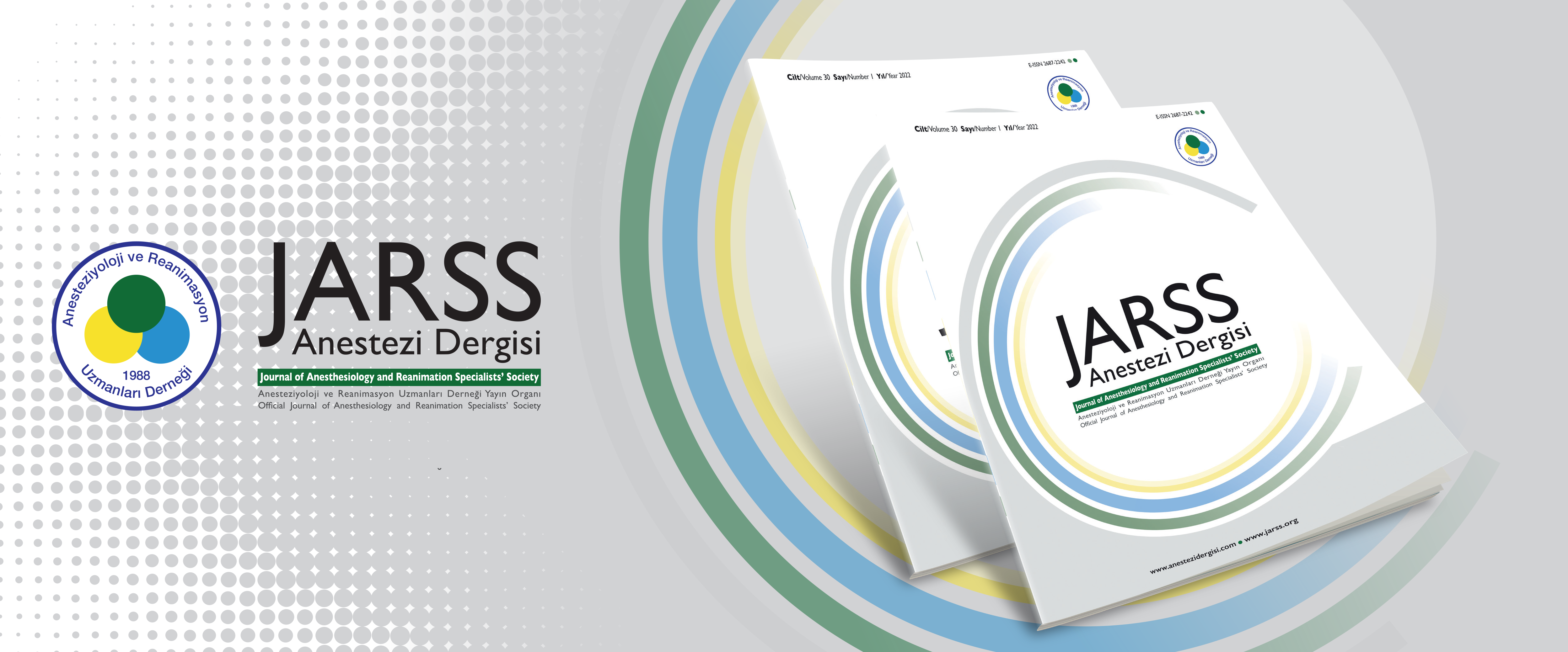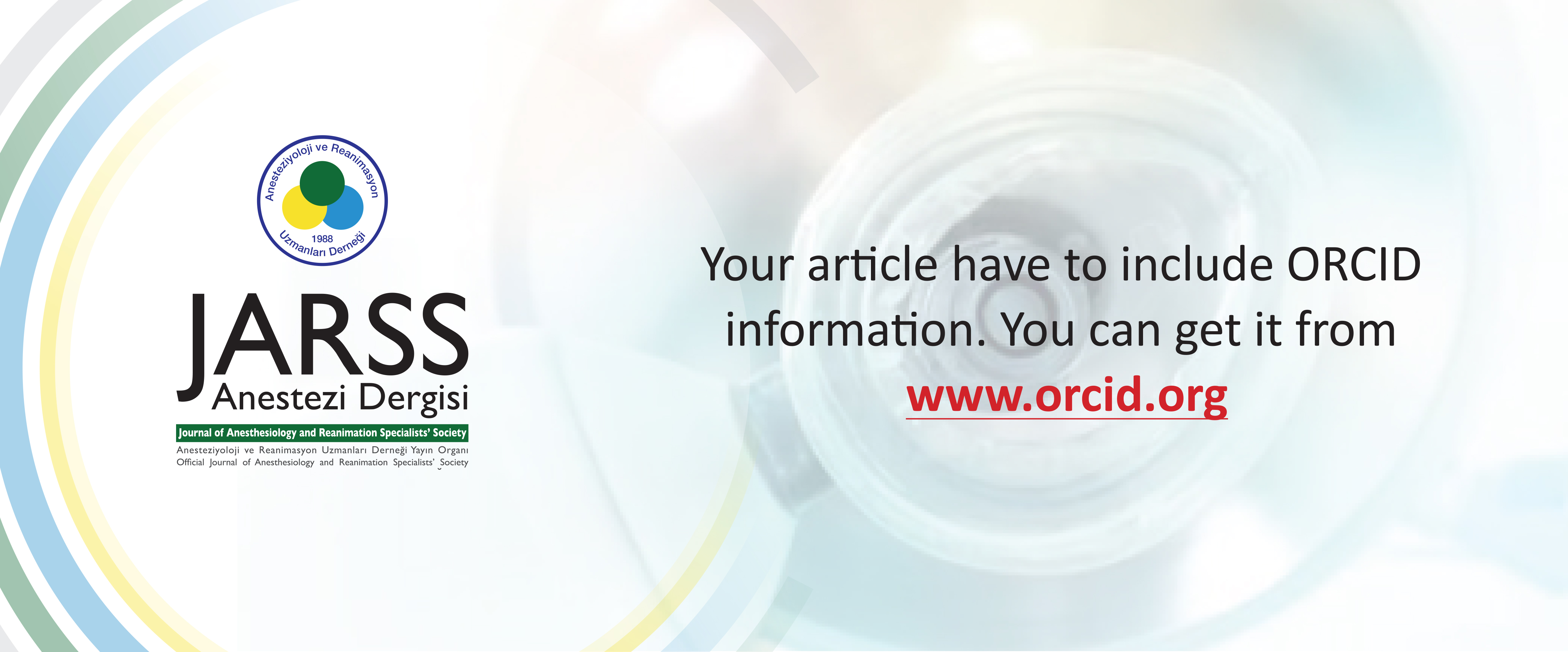The Association Between Burnout and Job Satisfaction Among Intensive Care Nurses: Exploring Influencing Factors
Duygu Kayar Calili1, Canan Un2, Oya Kilci2, Eda Macit Aydin3, Ferah Donmez4, Beyazit Dikmen5, Mustafa Baydar61Yildirim Beyazit University Faculty of Medicine, Ankara Bilkent City Hospital, Department of Anesthesiology and Reanimation-Intensive Care Unit, Ankara, Türkiye2Ankara Bilkent City Hospital, Clinic of Anesthesiology and Reanimation, Ankara, Türkiye
3Ankara Etlik City Hospital, Clinic of Anesthesiology and Reanimation-Intensive Care Unit, Ankara, Türkiye
4Polatlı Duatepe State Hospital, Clinic of Anesthesiology and Reanimation, Ankara, Türkiye
5Gazi University Faculty of Medicine, Department of Anesthesiology and Reanimation, Ankara, Türkiye
6Retired Anesthesiology and Reanimation Specialist, Türkiye
Objective: To determine the relationship between job satisfaction (JS) and burnout syndrome among intensive care unit (ICU) nurses, and examine the factors influencing burnout and JS.
Methods: After ethical approval, a questionnaire form, the Maslach Burnout Inventory (subscales D: Depersonalization, PA: Personal Accomplishment, and EE: Emotional Exhaustion) and the Minnesota Satisfaction Questionnaire (subscales IS: Intrinsic Satisfaction, ES: Extrinsic Satisfaction, and GS: General Satisfaction) were administered to volunteer nurses working in adult level 3 ICUs in eight tertiary hospitals in Ankara.
Results: Four hundred forty-nine nurses participated in the study. Burnout subscales were negatively correlated with JS subscales (p<0.05). With increasing age, burnout decreased in both D and PA subscales; as years of experience increased, burnout decreased in the PA subscale. Female nurses, nurses without children, and those working less than 40 hours had lower burnout on the PA subscale (p<0.05). Nurses who did not have health problems, transport and financial difficulties, who had social support, and who chose their profession purposely had lower EE and D scores (p<0.05). Nurses working in internal medicine ICUs, who were married, healthy, chose their profession, and had social support had higher JS scores (p<0.05).
Conclusion: Among ICU nurses, JS decreases as burnout increases. Factors influencing burnout and JS include age, sex, marital status, parenthood, health status, social support, voluntary career choice, type of ICU worked in, experience, working hours, and financial and transport difficulties.
Keywords: Intensive care units, nursing, burnout, job satisfaction
Yoğun Bakım Hemşirelerinde Tükenmişlik ve İş Doyumu Arasındaki İlişki: Etkileyen Faktörlerin Araştırılması
Duygu Kayar Calili1, Canan Un2, Oya Kilci2, Eda Macit Aydin3, Ferah Donmez4, Beyazit Dikmen5, Mustafa Baydar61Yıldırım Beyazıt Üniversitesi Tıp Fakültesi, Ankara Bilkent Şehir Hastanesi, Anesteziyoloji ve Reanimasyon-Yoğun Bakım Kliniği, Ankara, Türkiye2Ankara Bilkent Şehir Hastanesi, Anesteziyoloji ve Reanimasyon Ana Bilim Dalı, Ankara, Türkiye
3Ankara Etlik Şehir hastanesi, Anesteziyoloji ve Reanimasyon-Yoğun Bakım Kliniği, Ankara, Türkiye
4Polatlı Duatepe Devlet Hastanesi, Anesteziyoloji ve Reanimasyon Kliniği, Ankara, Türkiye
5Gazi Üniversitesi Tıp Fakültesi, Anesteziyoloji ve Reanimasyon Ana Bilim Dalı, Ankara, Türkiye
6Emekli Anesteziyoloji ve Reanimasyon Uzmanı, Türkiye
Amaç: Yoğun bakım ünitesi (YBÜ) hemşirelerinde iş doyumu (İD) ve tükenmişlik sendromu arasındaki ilişkiyi belirlemek ve tükenmişlik ve İD'yi etkileyen faktörleri incelemek.
Yöntem: Etik kurul onayı sonrası, Ankara’daki sekiz üçüncü basamak hastanenin erişkin 3. düzey YBÜ’lerinde çalışan gönüllü hemşirelere bir anket formu, Maslach Tükenmişlik Envanteri (alt ölçekler D: Duyarsızlaşma, KB: Kişisel Başarı, DT: Duygusal Tükenme ) ve Minnesota Doyum Anketi (alt ölçekler IS: İçsel Doyum, ES: Dışsal Doyum ve GS: Genel Doyum) uygulandı.
Bulgular: Araştırmaya 449 hemşire katıldı. Tükenme alt ölçekleri İD alt ölçekleri ile negatif korelasyon gösterdi (p<0,05). Yaş arttıkça hem D hem de KB alt ölçekleri; deneyim yılı arttıkça da KB alt ölçeğinde tükenme azaldı. Kadın, çocuğu olmayan ve 40 saatten az çalışan hemşireler KB alt ölçeğinde daha düşük tükenmişliğe sahipti (p<0,05). Sağlık sorunu, ulaşım ve ekonomik zorluğu olmayan, sosyal desteği olan ve mesleğini isteyerek seçen hemşirelerin DT ve D tükenme puanları daha düşüktü (p<0,05). Dahiliye YBÜ’de çalışan, evli, sağlıklı, mesleğini kendi seçen ve sosyal desteği olan hemşirelerin İD puanları daha yüksekti (p<0,05).
Sonuç: Yoğun bakım ünitesi hemşireleri arasında tükenmişlik arttıkça İD azalmaktadır. Tükenme ve İD’nu etkileyen faktörler arasında yaş, cinsiyet, medeni durum, çocuk sahibi olma, sağlık durumu, sosyal destek varlığı, gönüllü kariyer seçimi, çalışılan YBÜ’nin türü, deneyim, çalışma saatleri, ekonomik ve ulaşım zorlukları yer almaktadır.
Anahtar Kelimeler: Yoğun bakım üniteleri, hemşirelik, tükenme, iş doyumu
Manuscript Language: English
(301 downloaded)
















